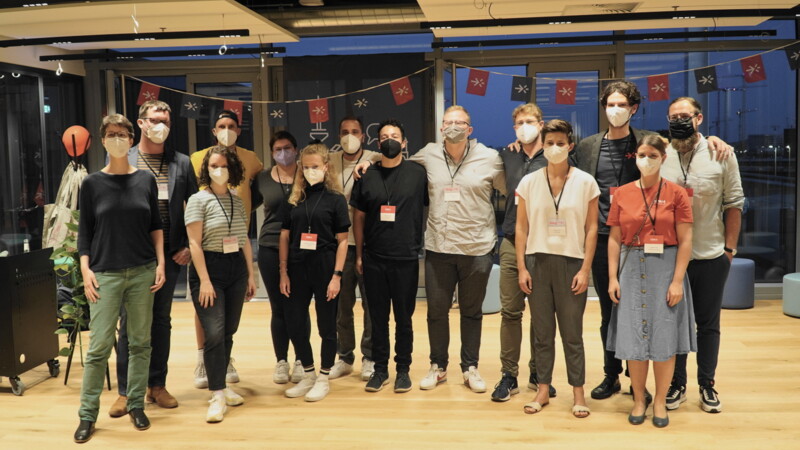Reaching readers and media consumers will be one of the biggest challenges for decades to come, said Julia Becker, Chair of the Supervisory Board of Funke Mediengruppe, at the opening of the Scoopcamp. The first day of the conference, moderated by Tagesschau anchor Constantin Schreiber, focused on news consumption and Generation Z (Gen Z) news skills. Speaking at the opening, Carsten Brosda, Hamburg's Senator for Culture and Media, remarked: "News literacy is more than a buzzword in educational debates. It is fundamental for the informed public and the media industry. People, who cannot recognize, the value of serious news will be unwilling to pay for it.”
Generation Z, artificial intelligence (AI), transparency and trust in media topped the agenda of the recently-ended Scoopcamp 2021 (September 15-16, 2021) in Hamburg. Organized by nextMedia.Hamburg and Deutsche Presse-Agentur dpa, delegates at the media innovation conference, also held as a free live stream event, attended keynotes, panel discussions and workshops focusing on the latest issues, trends and technologies in journalism. During a keynote entitled "Why should they believe us?", Alan Rusbridger, former editor-in-chief of The Guardian, focused on how journalists can convey the importance of their work to young people. Pia Frey, founder of Opinary, used stick figures to show what the established publishing sector can learn from the so-called creator economy or the growing number of individuals who use tools to make their users pay.
Established journalism meets Generation Z
“Try to get inside the mind of Generation Z!“
Digital natives have grown up with 9/11, the financial crisis, the climate crisis and the coronavirus pandemic. Not surprisingly, they are insecure and place little or no trust in institutions, said Rusbridger. Traditional media underestimate the level of distrust as they themselves are considered part of the ruling elite. The Pulitzer Prize winner urged media professionals: "Try to get inside the mind of generation Z! Aspects such as transparency, interaction ("conversations instead of megaphones"), authenticity, an open culture of error, independence and a focus on the essential are indispensable.” His keynote was followed by a panel discussion on how influencers help form young people's opinions and whether the former have anything in common with journalists.
Paywalls indicate increasing battle for attention
"The battle for attention, consumers who are willing to pay and talent will become even tougher," said Frey, who won this year's Scoop Award. Creatives and journalists have never found it easier to build up their own reach and earn money with their followers. Using stick figures, Frey outlined the ever-growing distance between the creator economy, i.e. individuals who earn money with newsletters and podcasts, for instance, and established publishers hiding increasingly behind paywalls. Gen Z’s lack of trust in large institutions also feeds into this, Frey added. Media companies should make individual, themed channels visible instead of placing all their offers behind anonymous paywalls and ideally through user-editor interaction.
AI start-ups keen on revolutionising media
Artificial intelligence from the perspectives of three promising media start-ups took centre stage on the second day of the conference day:
Ourdio: Johannes Knippenberg and Evangelia Kokinaki from Bielefeld are using AI to synthesise professional speakers’ voices e.g., to personalise audio books for children. The team took part in the second round of nextMedia.Hamburg's Media Lift funding programme.
Scriptbakery: This start-up is currently taking part in Hamburg’s Next Media Accelerator and is targeting publishers and magazines. Founder Jonas Navid Al-Nemri told delegates: "We have developed an algorithm that can read a book in seven seconds." That allows the five-strong team to filter out emotions from texts and to analyse their suitability for the reader.
Trensition: Belgian national Vincent Defour and a ten-strong team are developing a platform that automates trend and future research using artificial intelligence. The goal is to help decision-makers in media companies make optimum strategic decisions.
Future of AI in journalism
Christina Elmer, Professor of Digital Journalism and Data Journalism at TU Dortmund, Uli Köppen, Head of AI + Automation Lab at Bayerischer Rundfunk, and Matthias Spielkamp, joint founder and Managing Director of AlgorithmWatch, discussed how the media industry can fully exploit the potential of AI. The debate is still characterised by clichés and unfounded fears. Less mystification, more differentiation, transparency and concrete applications would boost acceptance among users and media professionals.
sb/kk/pb
Sources and further information
Scoopcamp
Organised by nextMedia.Hamburg and Deutsche Presse-Agentur (dpa), the annual innovation conference for media focuses on different dynamics every year. This year's Scoopcamp was backed by Civey, NOZ Medien and Zeit online and Meedia. The Scoopcamp symposium is facilitated via a partnership with the Netzwerk Recherche e. V. journalists' association as well as dpa's #UseTheNews project with backing from the Schöpflin Foundation and the Zeit Foundation.
More
Similar articles

How young people #UseTheNews

nextMedia.Hamburg presents survey on deepfakes and disinformation

Media Lift taking five start-ups to next level
